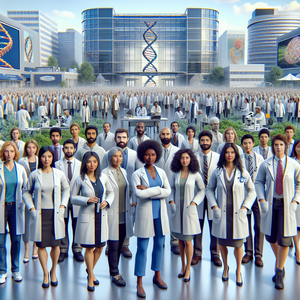
Diverse Career Pathways for Biology Graduates: Beyond Pre-Med Opportunities
A biology degree opens the door to a variety of career opportunities, often leading students toward medical school. Yet, the landscape for biology graduates is far more expansive, offering numerous rewarding roles in healthcare, research, and environmental science that do not necessitate a medical degree. This article highlights several career paths available to biology majors, emphasizing both conventional and innovative roles that enable graduates to make a significant impact in their chosen fields.
Job Summaries:
Medical Device Liaison:
- Professionals bridge the gap between medical device manufacturers and healthcare providers.
- They play a critical role in educating medical staff about the functionality and advantages of medical devices.
- Ultimately enhancing patient care.
- Candidates typically possess a biology degree.
- Candidates often have experience in sales or healthcare.
- This background allows them to communicate effectively about complex products.
Research Scientist:
- Research scientists engage in experiments and data analysis in fields such as genetics, microbiology, and pharmacology.
- Advanced positions often require a Ph.D.
- Opportunities for those with a bachelor’s or master’s degree exist as research assistants.
- This career is ideal for those passionate about scientific discovery and innovation.
- Research scientists contribute to the development of groundbreaking therapies and medical advancements.
Genetic Counselor:
- Genetic counselors play a vital role in assessing and communicating genetic risks to individuals and families.
- With a master’s degree in genetic counseling and certification, these professionals interpret genetic test results and guide patients in making informed decisions regarding their health.
- Their work is increasingly critical in the age of personalized medicine.
Biomedical Scientist:
- Biomedical scientists conduct laboratory tests and analyses essential for diagnosing diseases and evaluating treatment options.
- With a degree in biomedical science or a related discipline, this role requires meticulous attention to detail and proficiency in laboratory techniques.
- Biomedical scientists are indispensable in providing data that informs medical decisions.
Clinical Research Coordinator:
- Clinical research coordinators oversee clinical trials.
- Ensuring adherence to protocols and regulations.
- Managing logistics and participant recruitment.
- A background in biology or life sciences is typically required.
- Relevant certifications are needed.
- This position is instrumental in advancing medical knowledge.
- Improving patient care outcomes.
Wildlife Biologist:
- Wildlife biologists dedicate their work to studying animals and their habitats.
- They contribute to conservation initiatives.
- They conduct field research.
- They analyze ecological data.
- They develop management strategies aimed at preserving biodiversity.
- A degree in biology, ecology, or environmental science is fundamental for success in this role.
Health Educator:
- Health educators focus on promoting wellness and informing communities about health-related issues.
- They create educational programs on disease prevention and healthy living.
- Often working in schools, hospitals, or non-profit organizations.
- A degree in health education, public health, or biology is advantageous.
- Complemented by strong communication skills.
Pharmaceutical Sales Representative:
- In the pharmaceutical sector, sales representatives promote medications and medical products to healthcare providers.
- A solid foundation in biology aids them in effectively conveying scientific information, making a biology degree valuable for this role.
- Excellent interpersonal skills are essential for building relationships within the healthcare community.
Environmental Scientist:
- Environmental scientists analyze data related to environmental issues.
- They develop strategies to address challenges like pollution and waste management.
- A background in biology or environmental science is crucial.
- A commitment to sustainability and ecological preservation is important.
- This role is vital for fostering environmentally responsible practices.
Forensic Scientist:
- Forensic scientists utilize biological principles to analyze evidence from crime scenes, aiding in criminal investigations.
- Typically requiring a degree in biology or forensic science, this role demands strong analytical skills and a meticulous approach to evidence handling.
- Forensic scientists play an essential part in the justice system, collaborating closely with law enforcement.
In summary, biology graduates have a wealth of career options that extend far beyond the traditional path to medical school. From healthcare and research to environmental advocacy, these roles allow individuals to leverage their biology background to pursue fulfilling careers that resonate with their interests and values. Each position makes a unique contribution to its field, showcasing the versatility and relevance of a biology degree in today’s job market. As you contemplate your career journey, consider exploring job openings, gaining relevant experience, and reflecting on your passions to uncover the best path for your future. Engaging with professionals in these fields, attending workshops, or seeking mentorship can provide valuable insights and guidance as you navigate your options.
Explore More Jobs

